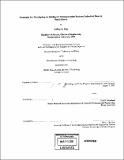Strategies for developing an intelligent transportation systems industrial base in South Korea
Author(s)
Kim, Jeffrey H., 1974-
DownloadFull printable version (2.313Mb)
Other Contributors
Massachusetts Institute of Technology. Technology and Policy Program.
Advisor
Carl D. Martland.
Terms of use
Metadata
Show full item recordAbstract
Thirty years of high economic growth has transformed South Korea into a middle-income country with strengths in many promising industries. However, the government of South Korea realizes that the country must constantly push into new areas to maintain its economic growth rates and achieve its goal of joining the ranks of advanced, First World nations. With the economic emergence of China and Southeast Asia, this pressure to advance up the value chain has intensified. Thus the government has been actively seeking new growth areas that will aid in the next level of South Korea's development. This thesis aims to examine the prospects of the Intelligent Transportation Systems (ITS) industry as a source of growth for the South Korean economy over the coming 20 years. It investigates the industry's potential for domestic growth as well as South Korea's prospects for becoming a major participant in the global market for ITS equipment and integration services. This paper discusses the arguments for various policies to encourage the development of the ITS industry. In particular, it draws on information about the latest ITS enabling technologies and South Korea's existing data infrastructure, as well as the country's financial constraints to analyze the feasibility of building a common ITS data transport infrastructure in the Seoul Metropolitan area. It also reviews the arguments for policies designed to develop ITS as an export industry. The examination suggests that South Korea's existing strengths in related technical fields, and the unique circumstances which make it an ideal test bed for new technologies, presents the country with opportunities for taking an early lead in this still developing market. In addition, the costs of funding key policies to encourage the development of ITS are well within reach for the national government, considering its financial situation. The paper concludes that the prospects for the ITS equipment and integration market over the next two decades are bright, and that the Korean government should consider nurturing it as a potential high-growth industry. ITS should not only be viewed as a promising technology for improving the efficiency of Korea's domestic transportation system, but as an industry that should be actively supported for its export potential.
Description
Thesis (S.M.)--Massachusetts Institute of Technology, Engineering Systems Division, Technology and Policy Program, 2003. Includes bibliographical references (leaves 43-44).
Date issued
2003Department
Massachusetts Institute of Technology. Engineering Systems Division; Technology and Policy ProgramPublisher
Massachusetts Institute of Technology
Keywords
Technology and Policy Program.